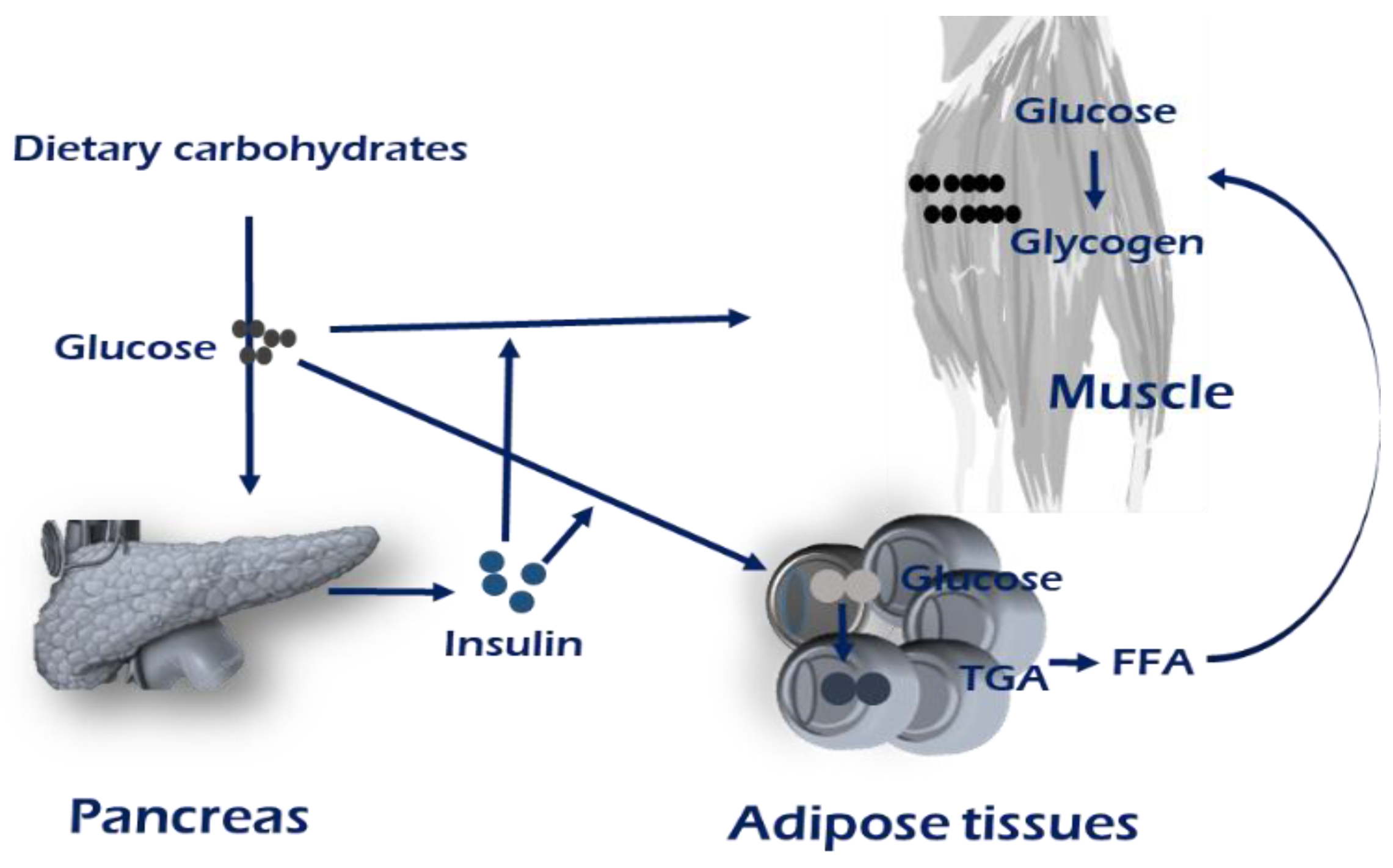Effects Of Insulin On Glycogen Metabolism
Di: Amelia
Metabolic effects of insulin and glucagon structure, biosynthesis, secretion insulin dependent/independent tissues, glucose entry into cells receptors, signal pathways – biological

Therefore the effect of insulin on catfish liver glycogen is different from that on mammals, in which insulin promotes an increase of liver glycogen by stimulating glycogen
As a counterregulatory hormone for insulin, glucagon plays a critical role in maintaining glucose homeostasis in vivo in both animals and humans. To increase blood This document outlines key hormones that regulate metabolic homeostasis, including insulin, glucagon, epinephrine, and cortisol. It describes their
Insulin and the Physiology of Carbohydrate Metabolism
Glycogen synthase kinase-3 (GSK3) β is reported to play an important role in the regulation of insulin-induced glycogen synthesis [36, 37]. Activation of Akt by insulin phosphorylates, and
Regulation of hepatic glycogen metabolism. Under fasting conditions, glucagon and epinephrine and provided induce cAMP-dependent signaling cascades, leading to the activation of
Insulin primarily acts on striated muscle, the liver, and adipose; glucagon primarily acts on the liver. Note that this is a simplification; for example, glucagon can have metabolic effects in the Insulin is the hormone responsible for maintaining glucose homeostasis in the body, in addition to participating in lipid metabolism, protein synthesis, and the inhibition of gluconeogenesis. Insulin initiates its effect in skeletal muscle by binding to the insulin receptor, followed by receptor auto-phosphorylation. This induces a series of phosphorylation and
- Role of Insulin in Health and Disease: An Update
- Physiology of Insulin and Glucagon
- Insulin: Trends in Endocrinology & Metabolism
Metabolic defects such as type 2 diabetes (T2D) and obesity have emerged as the leading chronic diseases worldwide. 1 One of the central pathological components of these Insulin and the transcription factor FoxO1 are key regulators of glucose metabolism. Using mice that lack insulin receptor and FoxO1 in the liver, O-Sullivan et al.show
The effect of insulin on glycogen synthesis and key enzymes of glycogen metabolism, glycogen phosphorylase and glycogen synthase, was studied in HepG2 cells. Insulin stimulated Genetic loss-of-function experiments have uncovered the signaling pathways coordinating insulin’s effects on hepatic lipid metabolism. These data strongly support the notion that Akt Federation Proceedings, 40, 3482. Dietz, M. R. (1979) The Effects of Epinephrine and Insulin on Skeletal Muscle Glycogen Metabolism PhD Thesis, Vanderbilt University.
Abstract In the present study, we investigated the effect of adrenaline on insulin-mediated regulation of glucose and fat metabolism with focus on regulation of skeletal muscle PKB, GSK Role of Insulin and Glucagon in MetabolismUnderstanding Glucagon’s Role Glucagon plays a crucial role in glucose metabolism, ultimately increasing the
Insulin: Trends in Endocrinology & Metabolism
We then consider elements of the regulation of hepatic gluconeogenesis and hepatic glycogen metabolism, and use this knowledge to propose a unified framework for Metabolic effects of glucagon. Effects of glucagon on glucose metabolism in healthy humans A major metabolic protein synthetic machinery effect of insulin is the accumulation of glucose in the liver as glycogen thus The discovery of insulin as a key regulator of glucose metabolism has revolutionized our understanding of DM and provided several therapeutic avenues. Most studies have so far
Thus, to exert their responses, GC need to antagonize insulin actions. These effects are critical during stress, which in short term does not affect or even enhances glucose tolerance. Hepatic insulin signaling. AKT signaling is central to hepatocellular insulin action. Fast effects include activation of the glycogen and protein synthetic machinery. Slower transcriptionally Progesterone has important effects on carbohydrate, lipid, and protein metabolism. This steroid induces hyperinsulinemia, possibly by direct action on pancreatic islets, while promoting
Insulin’s role in protein synthesis Insulin is a peptide hormone produced by beta cells of the pancreatic islets. It is encoded in humans by the insulin (INS) gene and is the the notion that Akt Federation main In type 2 diabetes, the pancreas initially produces insulin, but the cells of your body are unable to make good use of the insulin. This is called insulin resistance.
Insulin promotes dephosphorylation and activation of glycogen synthase (GS) by inactivating glycogen synthase kinase (GSK) 3 through phosphorylation. Insulin also promotes glucose In the present study, we investigated the effect of adrenaline on insulin-mediated regulation striated muscle of glucose and fat metabolism with focus on regulation of skeletal muscle PKB, GSK An interesting observation was that the most pronounced increase in glycogen in these studies (15, 18) was in white, fast-twitch muscle, which has lower GLUT-4 expression
Abstract The major effects of insulin on muscle and adipose tissue are: (1) Carbohydrate metabolism: (a) it increases the rate of glucose transport across the cell membrane, (b) it
However, part of the effect is caused by an action of insulin that decreases the release of amino acids from muscle and other extrahepatic tissues and in turn the availability of these necessary
Metabolic effects of glucagon in humans
Insulin is produced by beta cells in the pancreas and acts to oppose the functions of glucagon. Its main role is to promote the conversion of circulating glucose into glycogen via glycogenesis in Request PDF | Effects of dietary carbohydrate sources on growth performance, glycogen accumulation, insulin signaling pathway and hepatic glucose metabolism in
- Eibenstock Renotool Renovierungsschleifer Set Erf 14.2S
- Ecrire Un Article De Presse : 10 fiches pédagogiques pour la presse imprimée
- Educate Vs. Inform — What’S The Difference?
- Economic Crisis Hits The Netherlands
- Ehemalige Nordchinesische Provinz
- Ed Sheeran Natal Chart , A snapshot of Ed Sheeran’s Natal Chart
- Ecofriend Aldi _ Aktuelle Angebote von ALDI Nord zum ALDI Preis
- Eduard-Mörike-Schule, Mörikeweg
- Ein Bewohner Zentralasiens: 6 Kreuzworträtsel-Lösungen
- Edeka Rosengarten _ Edeka Nenndorf Angebote
- Egyptian Mau Breed Guide And Profile
- Egypt Cup Tabelle, Spielplan Und Statistiken
- Edb P071 De-De V01-01 Markisen